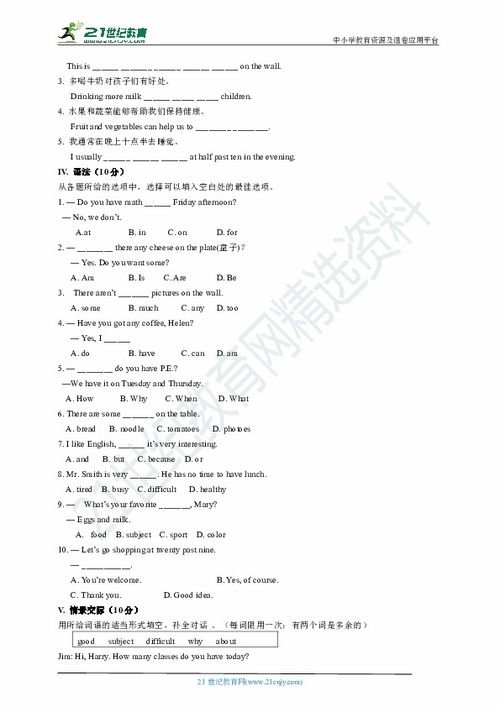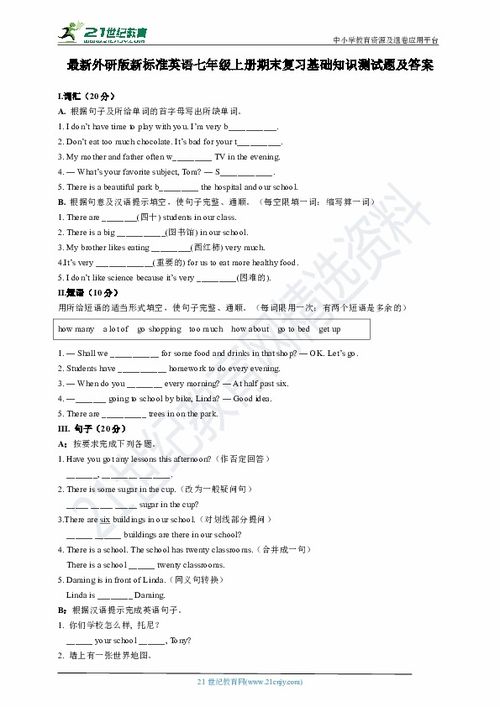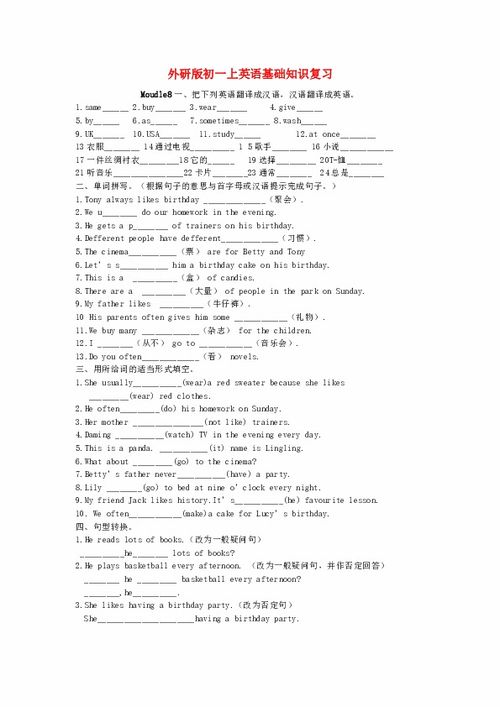外研版七级英语上册(外研版初一英语复习提纲和重点语法(上册))
1.外研版初一英语复习提纲和重点语法 (上册)
一.动词be(is,am,are)的用法 我(I)用am, 你(you)用are,is跟着他(he),她(she),它(it)。
单数名词用is,复数名词全用are。变否定,更容易,be后not加上去。
变疑问,往前提,句末问号莫丢弃。还有一条须注意,句首大写莫忘记。
二.this,that和it用法(1)this和that是指示代词,it是人称代词。(2)距离说话人近的人或物用this, 距离说话人远的人或物用that。
如:This is a flower. 这是一朵花。(近处) That is a tree. 那是一棵树。
(远处)(3)放在一起的两样东西,先说this, 后说that。如:This is a pen. That is a pencil. 这是一支钢笔。
那是一支铅笔。(4)向别人介绍某人时说This is…, 不说That is…。
如:This is Helen. Helen, this is Tom. 这是海伦,海伦,这是汤姆。(5)This is 不能缩写, 而That is可以缩写。
如:This is a bike. That's a car. 这是一辆自行车。那是一辆轿车。
(6)打电话时,介绍自己用this, 询问对方用that。如:—Hello! Is that Miss Green? 喂,是格林小姐吗?—Yes, this is. Who's that? 是的,我是,你是谁?注意:虽然汉语中使用“我”和“你”,但英语中打电话时绝不可以说:I am…, Are you…?/Who are you?(7)在回答this或that作主语的疑问句时, 要用it代替this或that。
如:①—Is this a notebook? 这是笔记本吗?—Yes, it is. 是的,它是。②—What's that? 那是什么?—It's a kite. 是只风筝。
三.these和those用法 this, that, these和those是指示代词,these是this的复数形式,指时间,距离较近的或下面要提到的人或事;those是that的复数形式,指时间、距离较远或前面已经提到过的人或事物。①This is my bed. That is Lily's bed. 这是我的床。
那是莉莉的床。②These pictures are good. 那些画很好。
③ Are those apple trees? 那些是苹果树吗?在回答主语是these或those的疑问句时,通常用they代替these或those以避免重复。如:④Are these/those your apples? 这些(那些)是你的苹果吗?Yes, they are. 是的,他们是。
四.不定冠词a和an a和an都是不定冠词,表示一(个,支,本,块……)的意思,但不强调数量概念,而是强调类别,用来限定名词。a用在辅音素开头的单数名词前,如:a pencil(一支铅笔),a book(一本书);an用在元音音素开头的名词前,如an eraser(一块橡皮)。
如果名词前有修饰语,用a还是用an,则以该修饰语的第一音素决定用a还是用an。如:a clock 一座钟 an old clock 一座旧钟 a book 一本书 an English book 一本英语书 a nice apple 一个可爱的苹果 an apple 一个苹果 五.名词+'s所有格 名词+'s所有格 单数名词后直接加 “ 's ” Jim's coat 吉姆的外套 Jeff's mother杰夫的妈妈 以s结尾的复数名词,只加“'” Teachers' Day教师节 the twins' books双胞胎的书 不以s结尾的不规则的名词复数,加“ 's ” Children's Day 儿童节 men's shoes男式鞋 表示两者共同拥有时,只在最后一个名词后加's 表示两者各自拥有时,要在每个名词后加's Lucy and Lily's mother 露茜和莉莉的妈妈(共同的妈妈,一个妈妈) Lucy's and Kate's rooms 露茜和凯特的房间(各自的房间,两间房子) 六.There be句型(1)There be句型主要用以表达“某处(某时)有某人(某物)。”
其基本结构为“There be+某物(某人)+某地(某时)”其中there是引导词,没有词义;主语是be后面的名词, be是谓语动词,在一般现在时中be只用is和are两种形式。下面这首歌诀可帮你巧记there be句型结构:There be放句首,主语跟在后。
地、时放句末,强调置前头。如:There is a book on the desk.有时为了强调地点,也可把介词短语放在句首。
如:On the desk there is a book.(2)There be句型中的be动词如何确定呢?请先看看下面这首歌诀:Be动词,有三个,am,is还有are。“There be”真特别,不留am只留俩,那就是is还有are。
要用is还是are,须看其后的名词是单数还是复数。若是单数或不可数名词用is,否则就用are。
如:①There is a tree behind the house.②There is some water(水)in the bottle(瓶子).③There are some pears in the box.(3)注意:如果“be”后的主语是由and连接的两个或两个以上的名词,那么be的形式要遵循“远亲不如近邻”的原则。也就是说,“be”的形式是由与它最近的那个名词来确定的。
若那个名词是单数或不可数名词要用is,是复数就用are。如:①There is a book and some pens on the floor.②There are some pens and a book on the floor.七.like一词的用法 like用作及物动词,译为“喜欢”。
(1)后接名词或代词,表示喜欢某人或某物。如:I like the baby very much. 我非常喜欢这个小孩。
(2)后接动名词(v. -ing),表示“喜欢做某事”,着重于习惯、爱好。如:Tom likes playing football. 汤姆喜欢踢足球。
(3)后接动词不定式(to do ),表示“偶尔地喜欢做某事”,着重于某次具体的行为。如:I like reading, but I like to watch TV this evening. 我喜欢读书,但我今晚想看电视。
八.一般现在时 一般现在时表示经常性、习惯性的动作,或表示现在的特征、状态。当主语是非第三人称单数时,行为动词的一般。

2.外研版初二英语上册的所有语法的详细讲解
so+谓语+主语:…也一样. 谓语:be动词/助动词/情态动词 2. so+主语+谓语:的确如此,真的这样. 3. help yourself/yurselves to。
请随便吃点。 4. 发现sb做sth : find sb doing sth 5. 不完全同意I don't really agree. 完全不同意I really don't agree. 6. 或者..或者。
either…or…..就近原则 既不..也不..neither…nor….就近原则 既。.又。
both…and….谓语用复数 7. 看起来,似乎It seems/seemed that….. 8. 由于。而闻名be famous for…. 9. 餐馆就餐用语:a table for two/sit at the table by the window/here's the menu/May I take your order?/could we have the bill?/That's all. 10. 问路Which is the way to…/where is…/How can I get to…/Is there a..near here/Can you tell me the way to…/Can you tell me how I can get to…? 11. turn right at the third crossing/traffic lights在第3个路口往右拐=take the third crossing on your right 12. 过桥go across the bridge=cross the bridge 13. 走到路的尽头go up this road to the end=go on until you reach the end. 14. at the street corner在街角 15. on sb's way to….在sb去…的途中/路上 16. what's the matter?=what's wrong?=what's the trouble?怎么了? 17. be sick in hospital/in bed 生病住院/卧床 18. Maybe it is there=it may be there可能在那里. 19. It takes/took/will take sb+时间+to do sth. Sb做sth花费了…时间 20. 路途遥远It's (5 kms)far(away) from…=That's quite a long way. 21. wait for…等待 22. 五分钟的步行/驾驶路程:five minutes' walk/drive 23. 迷路lose sb's way/sb be lost/sb get lost 24. just then=just at that time/moment就在那时 25. 首先first of all=at first 26. a big city like Tokyo像东京这样的大城市 27. It's easy/interesting/important/ (for sb) to do sth.(对sb来说)做sth是容易的/有趣的/重要的. 28. if 条件状语从句:从句一般现在时,主句一般将来时。
如:If it rains tomorrow, I will not go to the zoo. 29. at the head /end of…在…的前/尾部 30. 我的背很疼. My back hurts badly. 31. 为…做准备get /be ready for… 32. stop sb (from) doing sth.阻止/不让sb做sth 33. have a good/wonderful time=enjoy oneself 玩得很高兴 34. answer in a tired voice/with a smile 用疲惫的声音/面带微笑回答。 35. quarrel with sb on sth 为了sth与sb 吵架 36. complain about sth 为…而抱怨,投诉 37. 生病用语:sb have a headache=sb have a pain in the head 头痛,have a cough 咳嗽,have/catch a cold 感冒,have cancer 得了癌症。
38. have /take the medicine three times a day 吃药,每天3次 39. take sb's temperature 量体温,look over 医生检查病人 40. drink more water 多喝水,take more exercise 多锻炼 41. sb醒来: sb wake up, //sb 醒着的:sb be awake 42. sb 睡着了入睡 be/fall asleep 43. 忙着…bu busy doing/with sth 44. as soon as… 一… 就 。 45. sleeping pills安眠药,light music 轻音乐 46. again and again 再三地,一次又一次 47. dream about…梦见…; dream of… 梦想成为… 48. 系动词+形容词: be/smell/taste/sound/look/feel/turn/get/become 49. make trouble制造麻烦,惹是生非,make a noise 制造噪音 50. every five minutes 每隔5分钟 51. instead/instead of…代替,取而代之,反而 52. write to sb. 写信给sb 53. get enough sleep 睡眠充足;stay happy 保持心情开朗 54. on time 准时;in time 按时 55. sb had better (not) do sth, sb 最好(别)做sth 56. land on …登陆 57. pull…out of..=pull…up from…拉上来 58. 不定代词:something/anyone/nobody/everywhere等 59. we're all by ourselves=we're alone.单独,独自 60. feel a little afraid/don't be afraid. 有点害怕/别害怕 61. perhaps=maybe也许,可能 62. not …until… 直到…才… 63. sooner or later 迟早,早晚 64. ran after追//ran to …向..跑去// ran away 逃跑了 65. eat up 吃光// use up 用完 66. take (good) care of ..=look after…照顾,保管 67. 我自学英语learn English by myself= teach myself English 68. learn to do sth 学会… 69. 记日记 keep a diary,写日记 write a diary 70. leave sb by oneself 单独留下sb 71. join in the League/Party 入团/党 72. 越来越…:比较级+and+比较级; more and more +多音节词。
如:bigger and bigger , more and more interesting 73. 越…, 就越…: the +比较级,the +比较级。 如:越大越好:the bigger, the better 74. turn on/off 开/关(电器),turn up/down音量开大/小 75. the whole story=all the story整个故事,整件事情 76. 过了一会儿after a while/moment 77. make faces 做鬼脸 78. 名胜,景点interesting places=places of interest 79. my hometown in Zhejiang 我浙江的老家 80. 暑假summer holidays; 五一假期 May 1st holiday 81. a strong wind大风;in the wind 在风里 82. make sb do sth. 使/逼迫sb做sth 83. 倒装句(为了强调)There he is./ Away he went. 84. with these words. 说完这些话,说着说着(伴随状语)。
85. I don't know how to use it yet. 我不知道怎样使用它。 where to go. 我不知道该去哪里。
what to do. 我不知道该做什么。 86. wait for 。

3.初二上英语复习提纲(外研)
八年级下册新目标英语重点短语及句型总汇(二)2009-05-25 09:02常见动名词、分词的习惯用法总结
使用-ing分词的几种情况
1.在进行时态中。如: 1.He is watching TV in the room.
2.They were dancing at nine o'clock last night.
2.在there be结构中。如:There is a boy swimming in the river.
3.在have fun/problems结构中。如:We have fun learning English this term.
They had problems getting to the top of the mountain.
4.在介词后面。如:Thanks for helping me. Are you good at playing basketball?
What /How about doing sth? 做某事怎么样? I am interested in playing football.
5.在以下结构中
1. enjoy doing sth 喜欢做某事;
2. finish doing sth;完成做某事;
3. feel like doing sth 想要做某事;
4. stop doing sth 停止做某事(原来的事)
5. forget doing sth 忘记做过某事;
6. go on doing sth 继续做某事(原来的事);
7. remember doing sth 记得做过某事;
8. like doing sth 喜欢做某事;
9. find /see/hear/watch sb doing发现/看到/听到/观看某人做
10. try doing sth 试图做某事;
11. need doing sth 需要做某事;
12. prefer doing sth 宁愿做某事;
13. mind doing sth 介意做某事;
14. miss doing sth 错过做某事;
15. practice doing sth 练习做某事;
16. be busy doing sth 忙于做某事;
17. can't help doing sth 禁不住做某事;
18. waste time/money doing 浪费时间/金钱做…;
19. keep sb.doing 让…始终/一直做…
20. stop sb.(from)doing 阻止某人做某事
21. prefer doing B to doing B=like A better than A喜欢做A更喜欢做B
22. “do some +doing”短语
如:do some shopping/do some washing/do some reading/do some practicing/do some cleaning/do some speaking
23.“go doing”短语去做某事(主要指文娱活动等)
如:go shopping/go fishing/go swimming/go hiking/go skating/go camping/go skiing(滑雪/go boating /go hunting (打猎)
.注意动词的过去分词的常见搭配:
I feel(am/was) excited/ surprised/ amazed /interested /tired/pleased/worried/lost
Keep…closed/ a boy called/named Tom
4.外研版初二英语上册的所有语法的详细讲解
so+谓语+主语:…也一样. 谓语:be动词/助动词/情态动词 2. so+主语+谓语:的确如此,真的这样. 3. help yourself/yurselves to。
请随便吃点。 4. 发现sb做sth : find sb doing sth 5. 不完全同意I don't really agree. 完全不同意I really don't agree. 6. 或者..或者。
either…or…..就近原则 既不..也不..neither…nor….就近原则 既。.又。
both…and….谓语用复数 7. 看起来,似乎It seems/seemed that….. 8. 由于。而闻名be famous for…. 9. 餐馆就餐用语:a table for two/sit at the table by the window/here's the menu/May I take your order?/could we have the bill?/That's all. 10. 问路Which is the way to…/where is…/How can I get to…/Is there a..near here/Can you tell me the way to…/Can you tell me how I can get to…? 11. turn right at the third crossing/traffic lights在第3个路口往右拐=take the third crossing on your right 12. 过桥go across the bridge=cross the bridge 13. 走到路的尽头go up this road to the end=go on until you reach the end. 14. at the street corner在街角 15. on sb's way to….在sb去…的途中/路上 16. what's the matter?=what's wrong?=what's the trouble?怎么了? 17. be sick in hospital/in bed 生病住院/卧床 18. Maybe it is there=it may be there可能在那里. 19. It takes/took/will take sb+时间+to do sth. Sb做sth花费了…时间 20. 路途遥远It's (5 kms)far(away) from…=That's quite a long way. 21. wait for…等待 22. 五分钟的步行/驾驶路程:five minutes' walk/drive 23. 迷路lose sb's way/sb be lost/sb get lost 24. just then=just at that time/moment就在那时 25. 首先first of all=at first 26. a big city like Tokyo像东京这样的大城市 27. It's easy/interesting/important/ (for sb) to do sth.(对sb来说)做sth是容易的/有趣的/重要的. 28. if 条件状语从句:从句一般现在时,主句一般将来时。
如:If it rains tomorrow, I will not go to the zoo. 29. at the head /end of…在…的前/尾部 30. 我的背很疼. My back hurts badly. 31. 为…做准备get /be ready for… 32. stop sb (from) doing sth.阻止/不让sb做sth 33. have a good/wonderful time=enjoy oneself 玩得很高兴 34. answer in a tired voice/with a smile 用疲惫的声音/面带微笑回答。 35. quarrel with sb on sth 为了sth与sb 吵架 36. complain about sth 为…而抱怨,投诉 37. 生病用语:sb have a headache=sb have a pain in the head 头痛,have a cough 咳嗽,have/catch a cold 感冒,have cancer 得了癌症。
38. have /take the medicine three times a day 吃药,每天3次 39. take sb's temperature 量体温,look over 医生检查病人 40. drink more water 多喝水,take more exercise 多锻炼 41. sb醒来: sb wake up, //sb 醒着的:sb be awake 42. sb 睡着了入睡 be/fall asleep 43. 忙着…bu busy doing/with sth 44. as soon as… 一… 就 。 45. sleeping pills安眠药,light music 轻音乐 46. again and again 再三地,一次又一次 47. dream about…梦见…; dream of… 梦想成为… 48. 系动词+形容词: be/smell/taste/sound/look/feel/turn/get/become 49. make trouble制造麻烦,惹是生非,make a noise 制造噪音 50. every five minutes 每隔5分钟 51. instead/instead of…代替,取而代之,反而 52. write to sb. 写信给sb 53. get enough sleep 睡眠充足;stay happy 保持心情开朗 54. on time 准时;in time 按时 55. sb had better (not) do sth, sb 最好(别)做sth 56. land on …登陆 57. pull…out of..=pull…up from…拉上来 58. 不定代词:something/anyone/nobody/everywhere等 59. we're all by ourselves=we're alone.单独,独自 60. feel a little afraid/don't be afraid. 有点害怕/别害怕 61. perhaps=maybe也许,可能 62. not …until… 直到…才… 63. sooner or later 迟早,早晚 64. ran after追//ran to …向..跑去// ran away 逃跑了 65. eat up 吃光// use up 用完 66. take (good) care of ..=look after…照顾,保管 67. 我自学英语learn English by myself= teach myself English 68. learn to do sth 学会… 69. 记日记 keep a diary,写日记 write a diary 70. leave sb by oneself 单独留下sb 71. join in the League/Party 入团/党 72. 越来越…:比较级+and+比较级; more and more +多音节词。
如:bigger and bigger , more and more interesting 73. 越…, 就越…: the +比较级,the +比较级。 如:越大越好:the bigger, the better 74. turn on/off 开/关(电器),turn up/down音量开大/小 75. the whole story=all the story整个故事,整件事情 76. 过了一会儿after a while/moment 77. make faces 做鬼脸 78. 名胜,景点interesting places=places of interest 79. my hometown in Zhejiang 我浙江的老家 80. 暑假summer holidays; 五一假期 May 1st holiday 81. a strong wind大风;in the wind 在风里 82. make sb do sth. 使/逼迫sb做sth 83. 倒装句(为了强调)There he is./ Away he went. 84. with these words. 说完这些话,说着说着(伴随状语)。
85. I don't know how to use it yet. 我不知道怎样使用它。 where to go. 我不知道该去哪里。
what to do. 我不知道该做什么。 86. wait for sb's turn to do 。
5.求初中外研版英语所有知识点,谢谢
我这里有个介词口诀:早、午、晚要用in,at黎明、午夜、点与分。
年、月、年月、季节、周,阳光、灯、影、衣、冒in。
将来时态in。以后,小处at大处in。
有形with无形by,语言、单位、材料in。
特征、方面与方式,心情成语惯用in。
介词at和to表方向,攻击、位置
词性 中文
1 what pron 什么
2 is v 是
3 what's what is的缩写形式
4 your pron 你的,你们的
5 name n 名字
6 my pron 我的
7 I pron 我
8 am v 是
9 I'm I am的缩写形式
10 in prep 在。里(内,上)
11 row n (一)排,(一)行
12 one num 一
13 number n 数字,号码
14 two num 二
15 too adv 也
16 three num 三
17 are v 是
18 you pron 你,你们
19 yes adv 是
20 four num 四
21 five num 五
22 no adv & adj 不,不是
23 not adv 不
24 hi interj 喂(问候或唤起注意)
25 class n (学校里的)班级,年级
26 grade n 年级
27 six num 六
28 seven num 七
29 eight num 八
30 nine num 九
31 ten num 十
32 zero num & n 零
33 plus prep 加,加上
34 it pron 它
35 it's it is的缩写形式
36 how adv (指程度)多少,怎样
37 old adj 。岁的,老的
38 eleven num 十一
39 twelve num 十二
40 minus prep 减,减去
41 thirteen num 十三
42 fourteen num 十四
43 fifteen num 十五
44 hello interj 喂(问候或唤起注意)
45 please interj 请
46 can v.aux 能,可以,会
47 spell v 拼写
48 that pron 那,那个
49 secret n 秘密
50 this pron 这,这个

相关推荐
声明:本网站尊重并保护知识产权,根据《信息网络传播权保护条例》,如果我们转载的作品侵犯了您的权利,请在一个月内通知我们,我们会及时删除。
蜀ICP备2020033479号-4 Copyright © 2016 学习鸟. 页面生成时间:3.244秒









